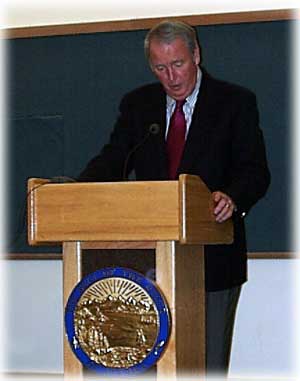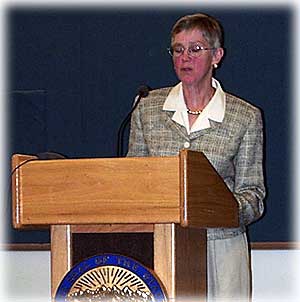 Gov. Murkowksi Discusses Environment
Protection Successes
Gov. Murkowksi Discusses Environment
Protection Successes
Goal is Enhanced Protection
of Alaska's Air, Land, Water
August 08, 2003
Friday - 7:40 pm
Ketchikan, Alaska - "Environmental protection is essential
to successful resource development policies," Governor Frank
H. Murkowski said today during a visit to Ketchikan. "We
can only create new jobs and a growing economy if we are responsible
stewards of our
|

Governor Murkowski
Photo by Dick Kauffman
|
environment. We are proud
of our record of protecting Alaska's environment, we are removing
unneeded and burdensome processes, and we are seeing clear results."
Murkowski said it is key to
distinguish between substantive environmental measures, and unnecessary
processes that don't accomplish anything.
Speaking at a news conference
at Ketchikan's Ted Ferry Civic Center, and accompanied by his
Commissioner of Environmental Conservation, Ernesta Ballard,
the Governor provided a recap of sweeping protective environmental
measures being initiated by his administration since taking office.
"The Governor's agenda
for improved environmental protection and more comprehensive
regulation is aggressive," Ballard said. Since taking office,
Murkowski has:
- Added 13 new positions in
DEC devoted to improving water and air permitting programs.
- Introduced successful contingency
plan legislation to expand protection from catastrophic spills.
The new law allows DEC to allocate more effort to on-the-water
spill drills and field testing equipment to build reliable response
skills.
- Implemented new regulations
to vessels exceeding 400 gross tons and approved plans for cruise
ships, ferries, log freighters, fish packers and private yachts
requiring each vessel to be prepared to mount an immediate clean
up and have guaranteed access to the necessary manpower and equipment.
The Ketchikan based company Seapro plays a key role in this expanded
protective program.
- Initiated complete redesign
of Alaska's food safety program that relies on operator certification,
restaurant specific risk assessment and risk management, and
rigorous enforcement by DEC. Owners and operators will be held
responsible for knowing how food becomes contaminated or spoiled
and assuring that standard operating procedures protect their
customers. This new program will provide equal protection from
Nome to Barrow, Tok, Fairbanks and Wrangell.
- Funded important studies that
will form the basis for better protection of public health including
a study to measure the effects of exposure to diesel exhaust
in rural Alaska. Human health studies of exposure to diesel exhaust
from trucks and buses have caused EPA to require national conversion
to ultra low sulfur diesel supplies by 2007. With this funding,
DEC will gather necessary health information for rural Alaskans;
and,
- Funded a fish monitoring study
that is nearing completion to determine mercury levels in Alaska
species. This study will provide Alaska specific information
about the quality of Alaska's subsistence, sport caught and commercially
harvested stocks.
- Approved complete overhaul
of Alaska's water regulations to develop a comprehensive approach
to groundwater, the source of drinking water for about 50% of
Alaska's total population, and 90% of Alaska's rural population;
a resource that is presently being inadequately addressed in
state law.
|

Ernesta Ballard, Commissioner
of
Environmental Conservation
photo by Dick Kauffman
|
Murkowski also said he
is committed to adopting a mining rule that recognizes mining's
characteristic impacts, such as the inevitable impact on groundwater
of mine development, mine tailings disposal and mine wastewater
treatment and discharge; and makes clear Alaska's regulatory
authority.
Solid waste regulations are
being revised, Murkowski said, to reduce the threat to groundwater
from large accumulations of land-filled garbage. Water quality
standards are also being reviewed, with one possibility being
the development of new standards and permitting procedures to
regulate discharges to groundwater.
"We have revised DEC's
low-interest municipal loan program to allow communities to borrow
for projects that address non-point sources of pollution such
as storm water run-off, landfill leachate and harbor wastes,"
Murkowski said. "Seven communities have applied under the
new guidelines, primarily to protect groundwater."
Finally, Murkowski announced
he is seeking legislative approval for an important agreement
with the Environmental Protection Agency.
"We are asking the next
legislature for permission to assume full responsibility for
regulating discharges to Alaska's waters such as those from municipal
treatment work, factories, and mines," Murkowski said. "Permitting,
compliance and enforcement should be done by Alaskans who are
knowledgeable about Alaska and confident in applying national
standards to Alaskan conditions."
Post a Comment -------View Comments
Submit an Opinion - Letter
Sitnews
Stories In The News
Ketchikan, Alaska
|


